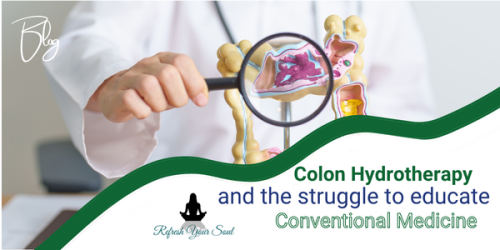A call for integration, awareness, and updated clinical understanding
By Wendy — Integrative Colon Hydrotherapist, Educator & Author of RYSE From Within: A Guide to Heal Your Gut
Introduction: A Growing Divide
Despite the growing popularity of integrative therapies and the rise in gut-related disorders, colon hydrotherapy (CHT) continues to face resistance—particularly from conventional and allopathic practitioners. While many clients experience significant improvements in digestion, detoxification, and emotional well-being, physicians often remain dismissive or skeptical.
Why?
My hypothesis: This resistance stems from (1) outdated medical training, (2) variability in hydrotherapy practices, and (3) misinformation around safety and efficacy. Yet the scientific literature increasingly supports CHT as a gentle, effective method for relieving constipation, improving quality of life, and even preparing for colonoscopy.
1. Outdated Education & Bias in Clinical Practice
Medical education focuses on pharmacological solutions, often excluding discussions on integrative therapies like colon hydrotherapy. Many physicians are unaware that the FDA has cleared colon hydrotherapy devices for occasional constipation and for pre-endoscopic bowel cleansing when medically indicated [1].
Doctors are routinely trained to manage constipation using stimulant laxatives, stool softeners, or fiber supplements—interventions that may worsen the gut lining over time or impair motility. In contrast, colon hydrotherapy hydrates the bowel, softens stool, stimulates peristalsis, and supports natural elimination without chemical irritation.
2. Lack of Regulation Fuels Mistrust
Many physicians express concern over the inconsistency of hydrotherapy delivery across spas, wellness centers, and medical offices. Unlike regulated clinical procedures, hydrotherapy varies based on training, equipment (open vs. closed systems), and practitioner experience.
While this variability is a legitimate concern, research from GI centers using FDA-cleared, high-volume open systems has demonstrated excellent results:
- 97% adequacy for bowel cleansing,
- No serious adverse events, and
- High patient satisfaction and willingness to repeat [2].
3. Misinformation: Microbiome & Electrolyte Myths
The most common argument against colon hydrotherapy is that it “washes out the good bacteria” or alters electrolytes. These claims are not strongly supported by evidence.
A study by Zhang et al. (2016) using PCR-DGGE analysis found that colonic irrigation had minimal impact on microbiota composition, and diversity was largely restored within 2 weeks [3]. Furthermore, while electrolyte shifts may occur, a 2021 clinical trial found no statistically significant changes in sodium, potassium, chloride, or renal function markers following mechanical hydrotherapy sessions [4].
It’s worth noting that oral purgative-based colonoscopy prep—still widely used—can cause more discomfort and biochemical disruption than colon irrigation [5].
What Colon Hydrotherapy Offers That Laxatives Don’t
- Hydration without chemical stress
- Support for natural motility
- Reduction of impacted waste, which can fuel inflammation and dysbiosis
- Empowerment through non-pharmaceutical detox pathways
A 2008 prospective study on colonic irrigation for defecation disorders found significant improvements in both constipation and fecal incontinence across multiple patient groups [6]. Another 2024 position paper on transanal irrigation noted the growing relevance of water-based bowel cleansing for refractory constipation [7].
A Call for More Research—And More Curiosity
Yes, more randomized controlled trials are needed. But research is expensive, and CHT lacks the pharmaceutical funding engine. What we do have is enough emerging data to say this therapy is safe, supportive, and effective—especially when delivered by trained professionals using modern equipment.
If GI doctors truly wish to support their patients’ gut health, they must begin to ask:
What if this is a tool I’ve ignored simply because I wasn’t trained in it?
Conclusion: Bridging the Divide
Colon hydrotherapy deserves a seat at the table in modern digestive care—not as a replacement for medicine, but as a complementary therapy that promotes detox, bowel motility, and whole-body healing.
We don’t need to choose between medicine and hydrotherapy. We need to educate, regulate, research—and most of all—listen to what our clients are already experiencing in their healing journeys.
References
- FDA. (2000). 510(k) Summary for Colenz® Colon Irrigation System. K001216.
- Hogan, R. B., Underwood, J. A., Wright, C., Lestina, L. S., Mangels, D. G., & O’Toole, T. (2021). Open-System Colon Irrigation Bowel Prep for Colonoscopy is a Safe and Effective Alternative to Oral Prep. JSM Gastroenterology and Hepatology, 8(1): 1098.
- Zhang, Y., et al. (2016). The influence of colonic irrigation on human intestinal microbiota. InTechOpen.
- Alemrajabi, M., Shojae, S. F., Moradi, M., Dehghanian, A., Ehsani, A., & Valinia, S. S. (2021). Mechanical colon cleansing device in patients with chronic constipation: An experimental study. Med J Islam Repub Iran, 35:84.
- Sportes, A., et al. (2016). A randomized trial comparing high-volume rectal water irrigation with standard 4L split-dose PEG preparation before colonoscopy. Clin Res Hepatol Gastroenterol, 40(4), 517–523.
- Koch, S. M. P., et al. (2008). Prospective study of colonic irrigation for the treatment of defaecation disorders. British Journal of Surgery, 95(10), 1273–1279.
- Bazzocchi, G., et al. (2024). Position paper on transanal irrigation in chronic non-organic constipation. Digestive and Liver Disease, 56, 770–777.

